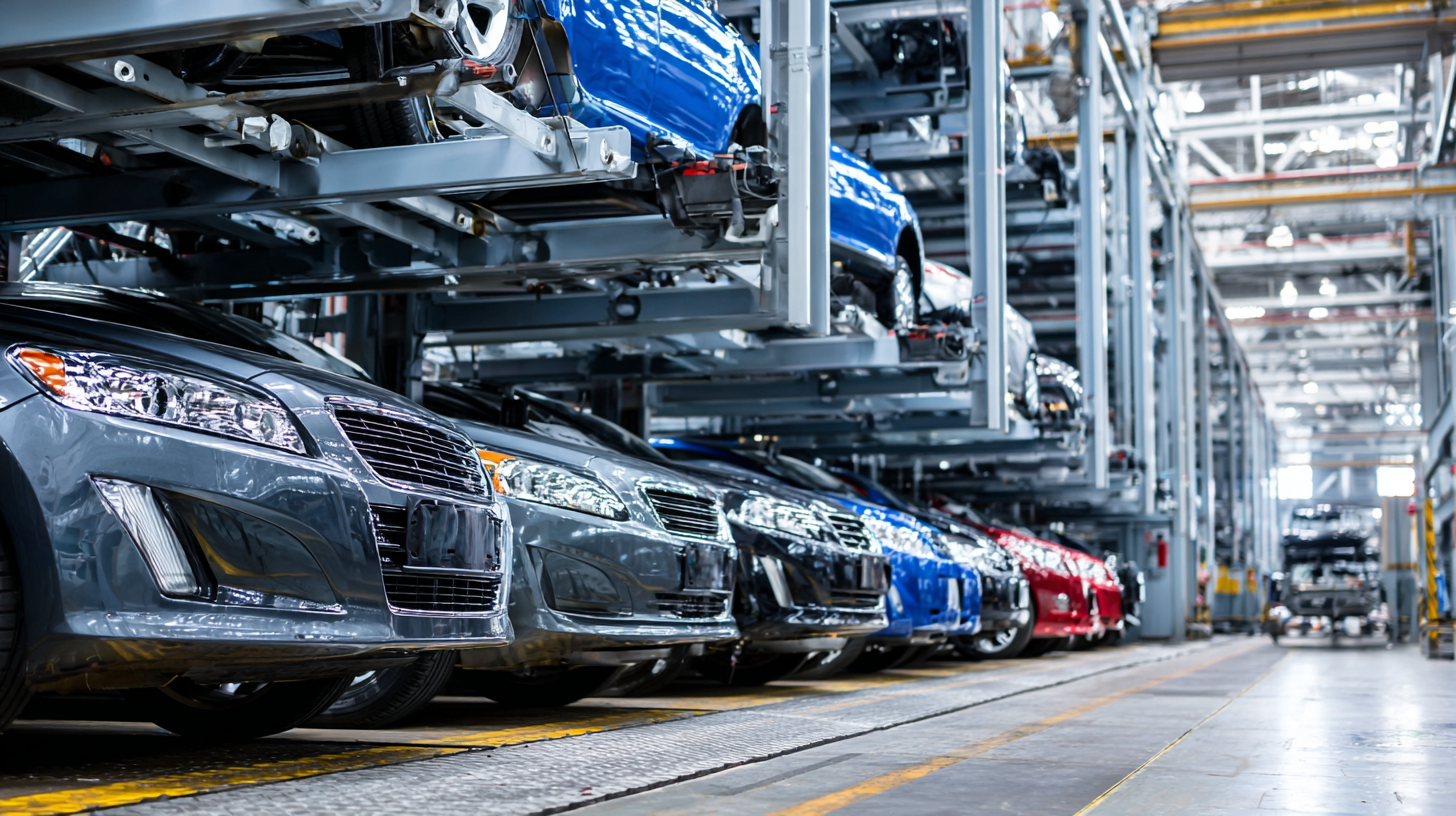Understanding the Role of Car Distributors: Your Guide to a Smooth Automotive Supply Chain
In the complex landscape of the automotive industry, understanding the pivotal role of car distributors is essential for ensuring a smooth supply chain. Car distributors serve as crucial intermediaries between manufacturers and retailers, handling a substantial portion of vehicle distribution, which the International Organization of Motor Vehicle Manufacturers reported to encompass over 80% of total car sales globally. As the automotive sector grapples with challenges such as fluctuating consumer demand and supply chain disruptions, the effectiveness of distributors has become more critical than ever.

According to a report by McKinsey & Company, car distributors who adopt advanced technologies and data analytics are significantly better positioned to optimize inventory management and enhance customer satisfaction. Hence, navigating the intricacies of car distribution not only streamlines operations but also drives profitability in an increasingly competitive market.
The Importance of Car Distributors in the Automotive Industry
In the automotive industry, car distributors play a pivotal role in ensuring a smooth supply chain, serving as the crucial link between manufacturers and consumers. Their responsibilities encompass managing inventory, coordinating logistics, and providing a vital channel for market insights. Recent reports highlight that the automotive aftermarket is experiencing significant growth, with a projected compound annual growth rate (CAGR) of 5% for automotive tires from 2025 to 2034, reaching a market value of approximately $23.85 billion by 2034.
Moreover, the automotive industry is witnessing remarkable transformations, particularly with the rise of electric vehicles. The introduction of leading brands into new markets emphasizes the importance of having competent car distributors who can navigate local regulations and consumer preferences. For instance, the electric vehicle sector in certain regions has seen exponential growth, with car distributors now responsible for not only logistics but also fostering customer relationships and building brand loyalty in emerging markets. This adaptability is essential as the automotive landscape continues to change, urging distributors to enhance their strategies to stay competitive.
Key Functions of Car Distributors Within the Supply Chain
 Car distributors play a critical role in the automotive supply chain, acting as intermediaries between manufacturers and retailers. Their primary function is to acquire vehicles from manufacturers and manage the logistics of delivery to various dealerships. This includes not only the transportation of vehicles but also the handling of inventory and ensuring that the supply meets market demand. Effective inventory management is crucial, as it allows distributors to maintain an optimal stock level, reducing costs associated with overstocking or stockouts.
Car distributors play a critical role in the automotive supply chain, acting as intermediaries between manufacturers and retailers. Their primary function is to acquire vehicles from manufacturers and manage the logistics of delivery to various dealerships. This includes not only the transportation of vehicles but also the handling of inventory and ensuring that the supply meets market demand. Effective inventory management is crucial, as it allows distributors to maintain an optimal stock level, reducing costs associated with overstocking or stockouts.
In addition to logistics, car distributors also provide essential services such as marketing and sales support for the vehicles they supply. They often assist dealerships in promoting new models and managing customer relationships. Moreover, distributors might offer training programs to dealership staff, enhancing their sales techniques and product knowledge. By fulfilling these functions, car distributors ensure that the automotive supply chain operates smoothly, facilitating a seamless flow of vehicles from manufacturers to end customers.
Challenges Faced by Car Distributors in Today's Market
In today's competitive automotive market, car distributors face a myriad of challenges that can impact their operations and profitability. One significant issue is the fluctuation in demand caused by shifting consumer preferences and economic uncertainties. Distributors must effectively manage their inventory to align with these changes, ensuring they do not overstock or miss sales opportunities. Moreover, the rise of electric vehicles and advanced automotive technologies requires distributors to adapt quickly to new models and maintain a diverse inventory that meets evolving customer expectations.
Another pressing challenge is the increasing complexity of the supply chain. Global disruptions, such as those experienced during the pandemic, have highlighted vulnerabilities in logistics and sourcing. Distributors often struggle with delayed shipments and supply shortages, which can hinder their ability to deliver vehicles on time. Additionally, the emphasis on sustainability and green practices adds another layer of complexity, as distributors must navigate regulations while seeking environmentally friendly sourcing and transportation methods. By addressing these challenges, car distributors can enhance their operational efficiency and maintain a competitive edge in the automotive industry.
Challenges Faced by Car Distributors in Today's Market
How Car Distributors Enhance Customer Satisfaction and Loyalty
 Car distributors play a crucial role in enhancing customer satisfaction and loyalty within the automotive supply chain. By serving as intermediaries between manufacturers and dealerships, they ensure that vehicles are readily available to consumers. This availability not only meets immediate customer needs but also fosters a sense of reliability and trust in the brand. When customers know they can depend on distributors to provide the latest models and essential services, their overall satisfaction with the purchase process increases significantly.
Car distributors play a crucial role in enhancing customer satisfaction and loyalty within the automotive supply chain. By serving as intermediaries between manufacturers and dealerships, they ensure that vehicles are readily available to consumers. This availability not only meets immediate customer needs but also fosters a sense of reliability and trust in the brand. When customers know they can depend on distributors to provide the latest models and essential services, their overall satisfaction with the purchase process increases significantly.
Moreover, car distributors are instrumental in creating personalized experiences for customers. They often gather valuable feedback and insights from dealerships, which allows them to tailor their offerings to better suit consumer preferences. By addressing specific needs, such as financing options or after-sales support, distributors enhance the overall buying experience. This personalized approach not only encourages repeat business but also cultivates long-term loyalty, as customers feel valued and understood. In today’s competitive market, the efforts of car distributors in fostering customer satisfaction can make a substantial difference in building lasting relationships between consumers and automotive brands.
Future Trends Shaping the Role of Car Distributors in Automotive Sales
The role of car distributors in the automotive supply chain is experiencing significant transformation, largely due to emerging trends in technology and consumer behavior. One major trend is the rise of digital retailing, which allows customers to research, customize, and purchase vehicles online. Distributors are adapting by enhancing their digital platforms and integrating online sales processes, ensuring a seamless experience for consumers who value convenience and efficiency. This shift not only streamlines operations but also offers distributors valuable data insights to better understand customer preferences.
Another pivotal trend is the growing emphasis on sustainability. As environmental concerns escalate, car distributors are increasingly tasked with promoting electric vehicles (EVs) and hybrid models. This requires a substantial shift in inventory management and marketing strategies, with distributors educating consumers about the benefits of these vehicles, including potential cost savings and ecological advantages. By focusing on sustainable practices and supporting the transition to greener products, car distributors play a crucial role in shaping the future of automotive sales, responding to both market demands and legislative requirements.




